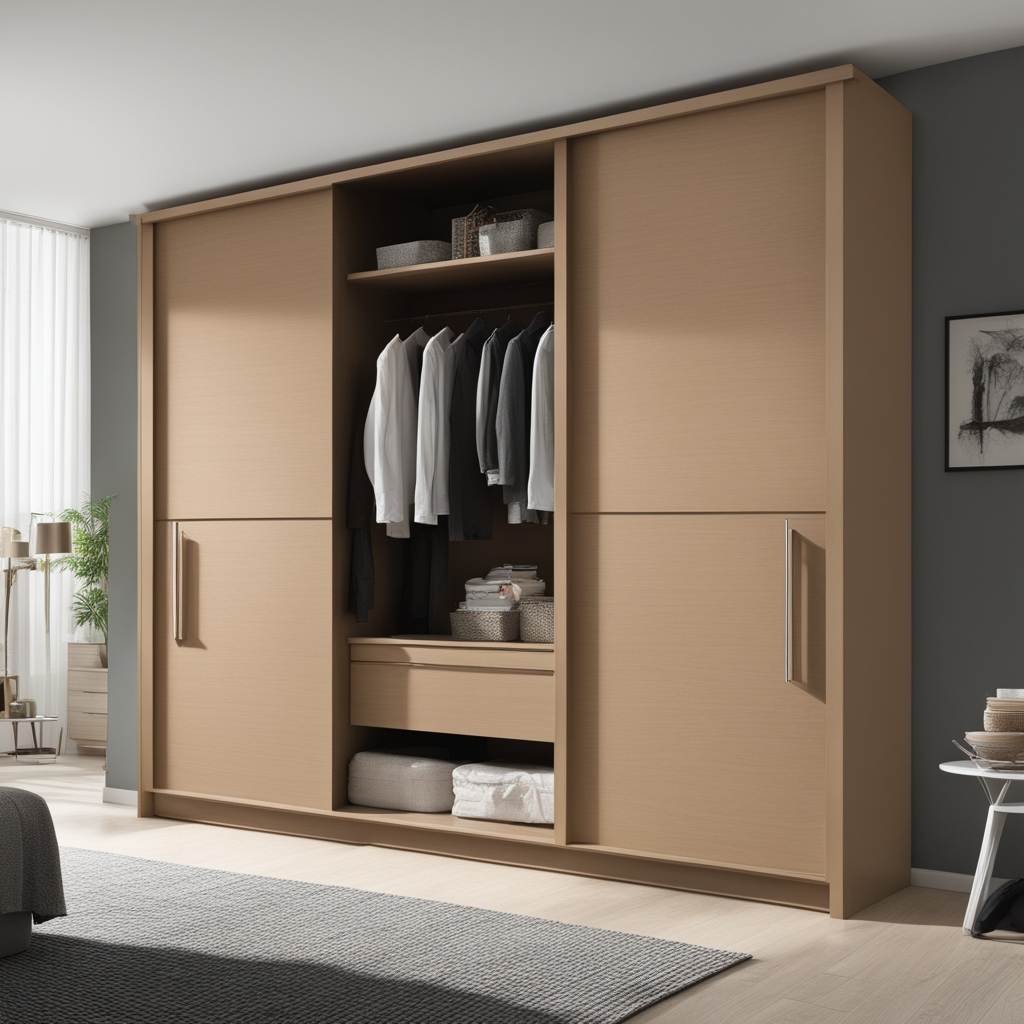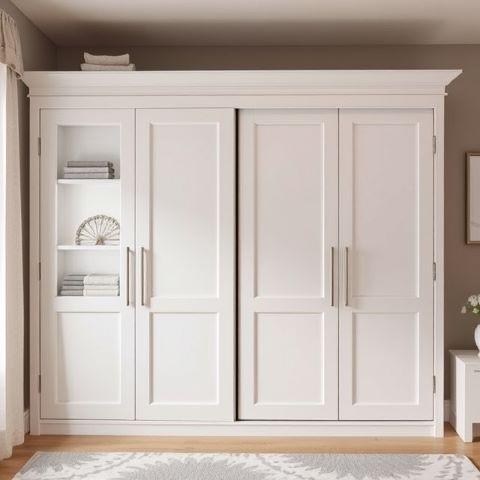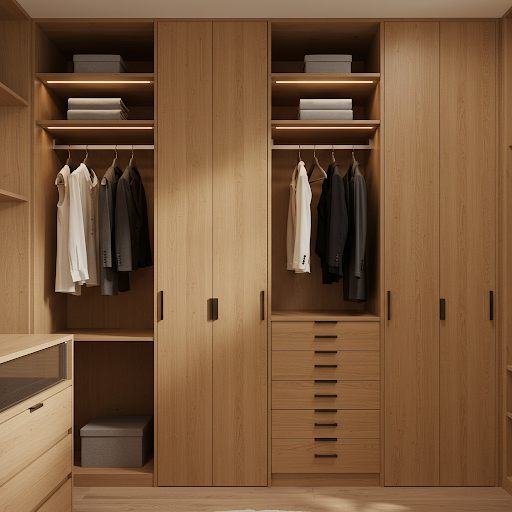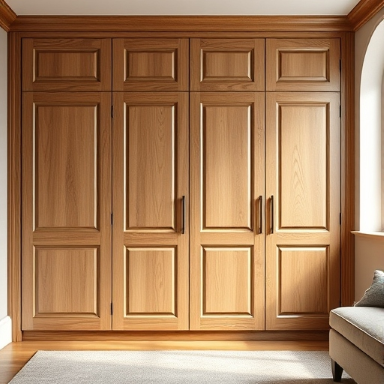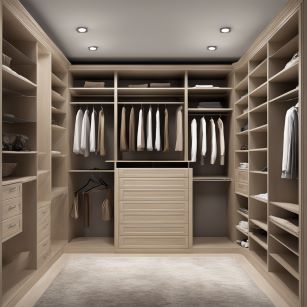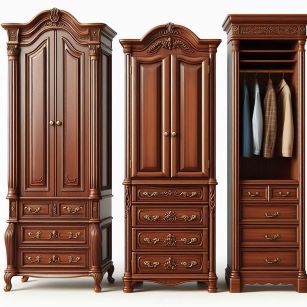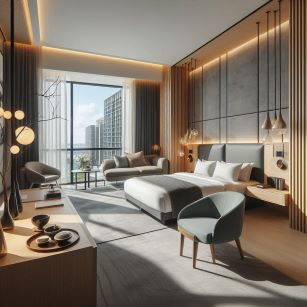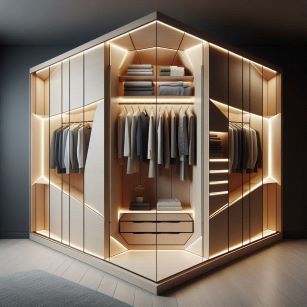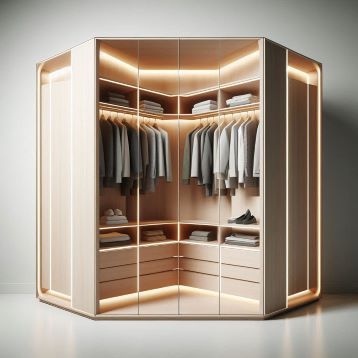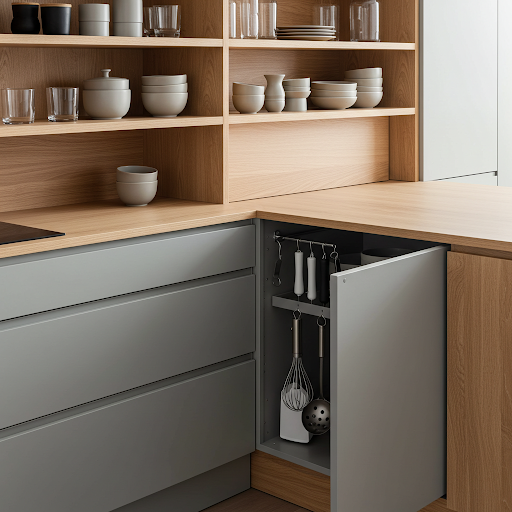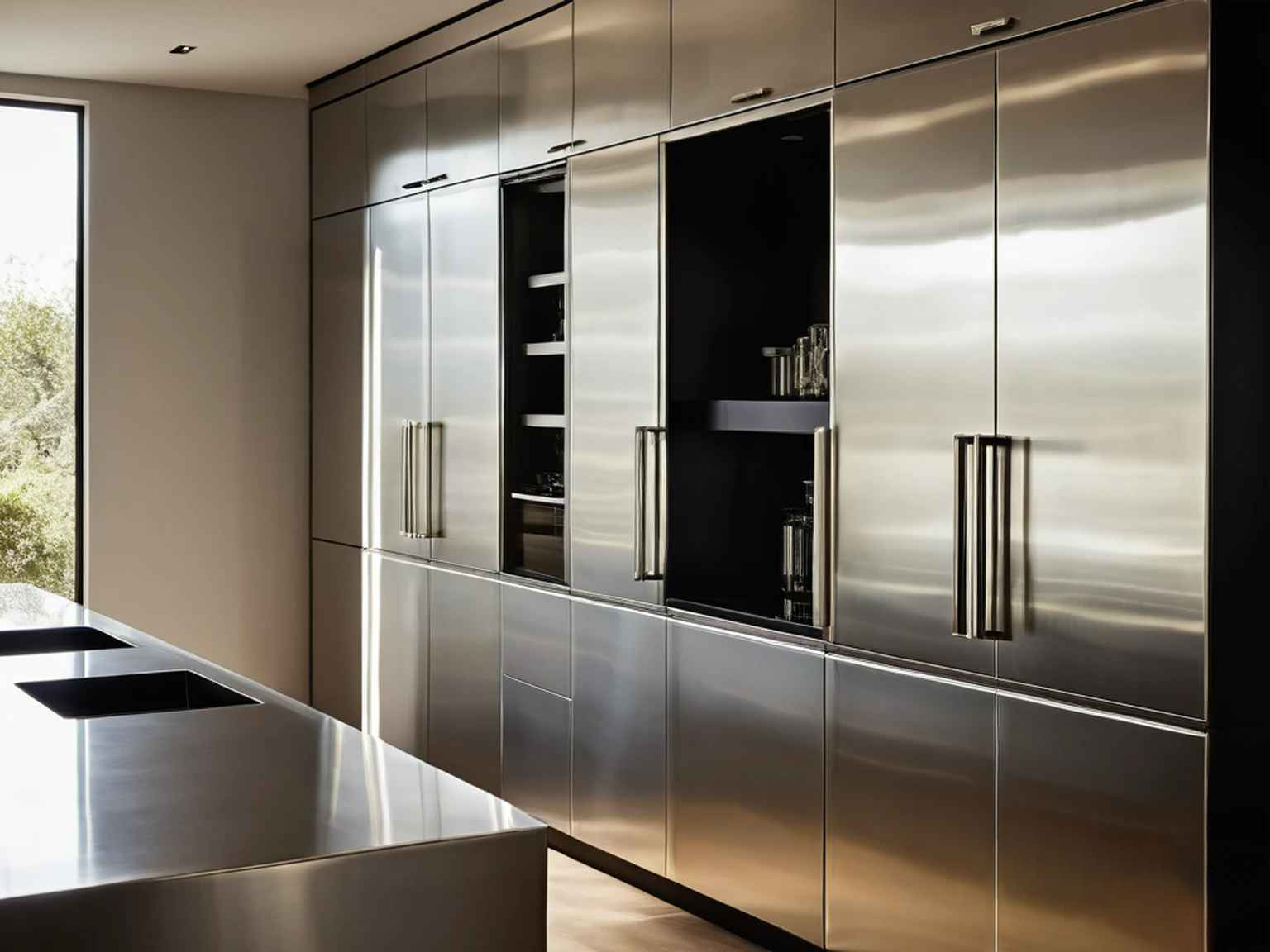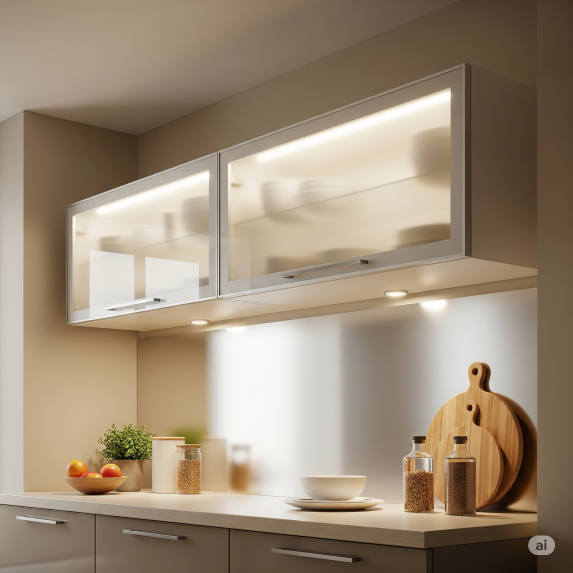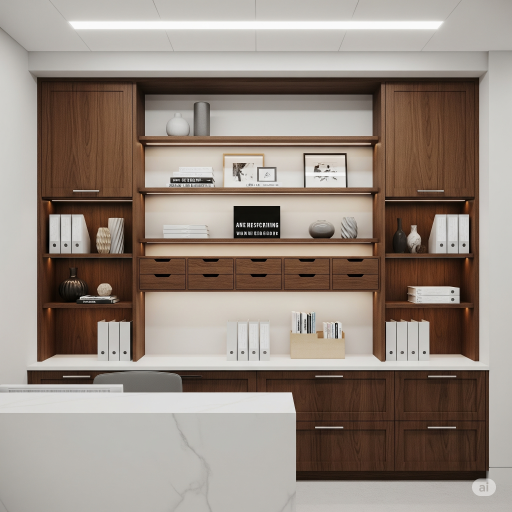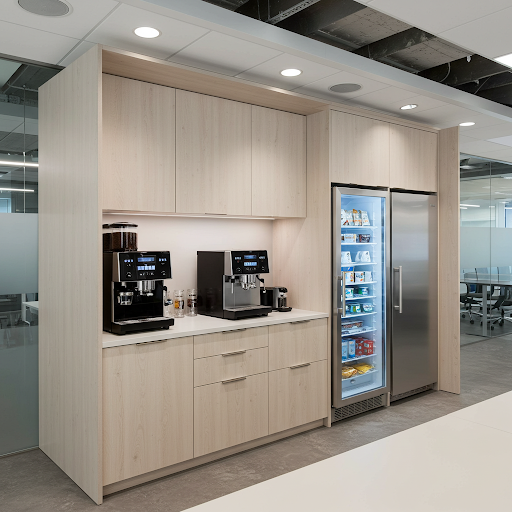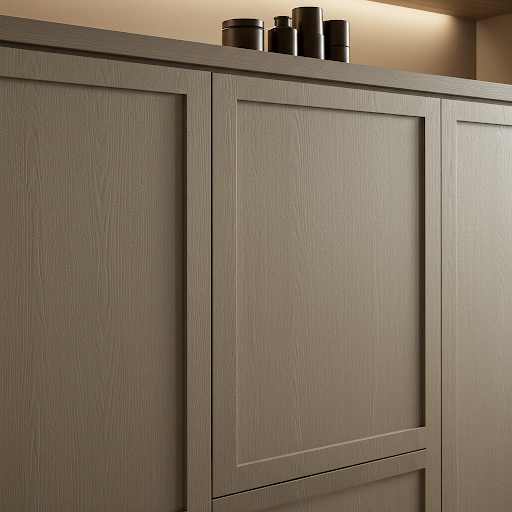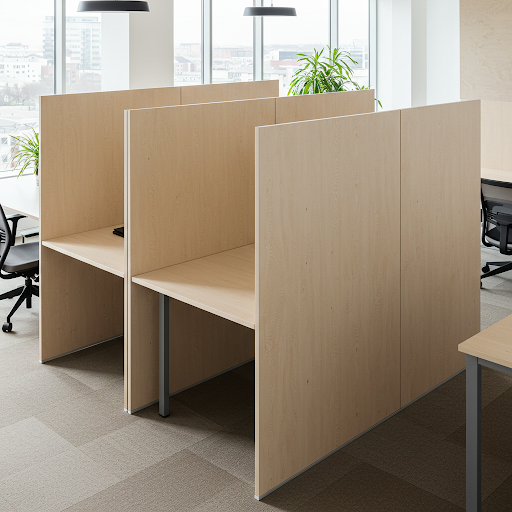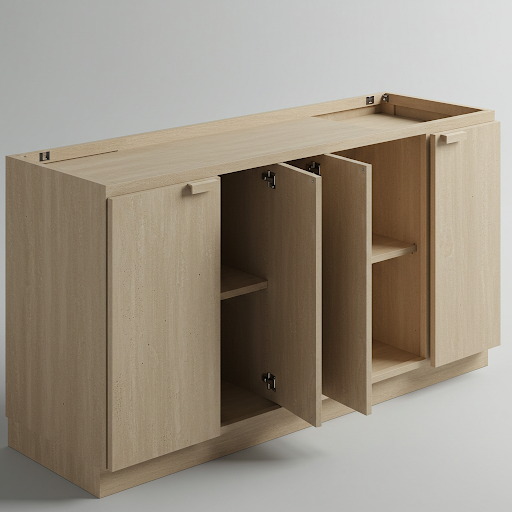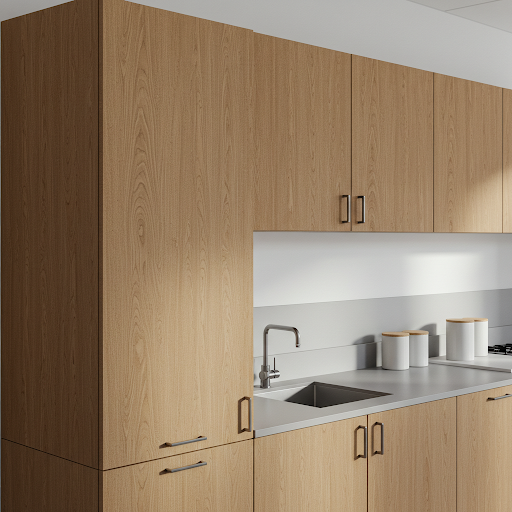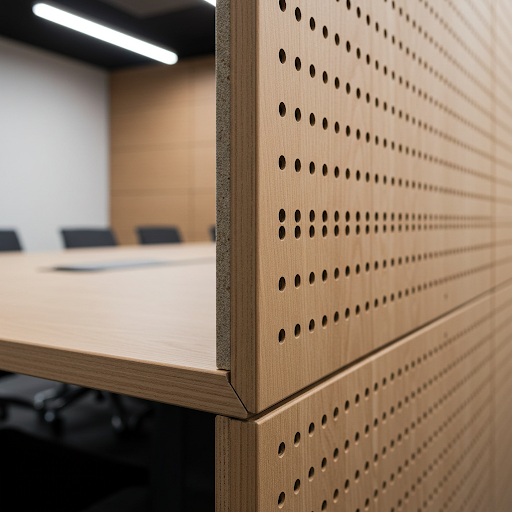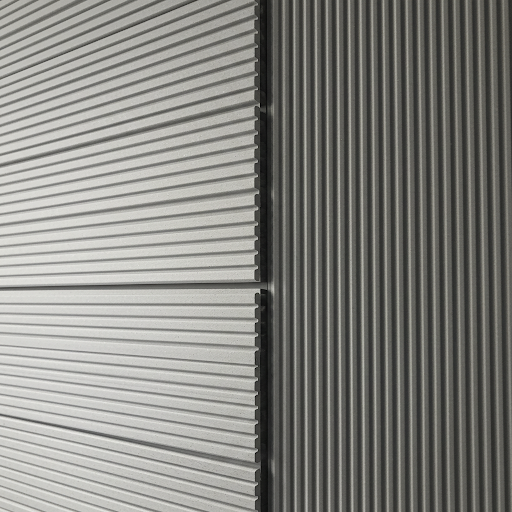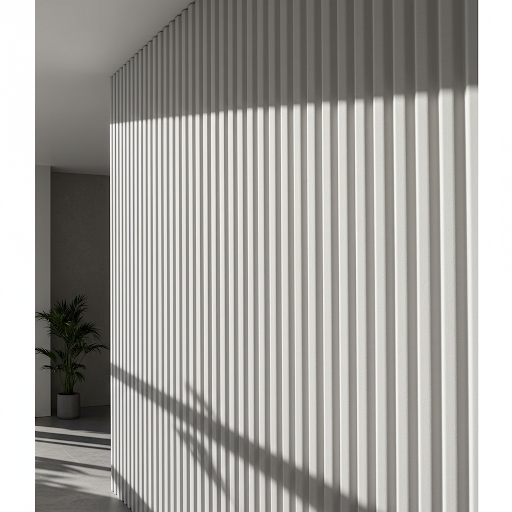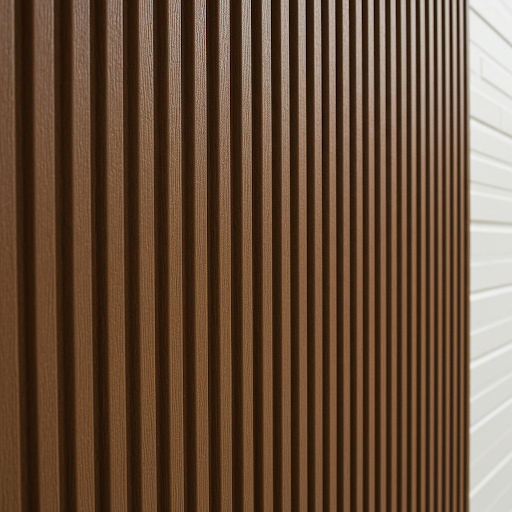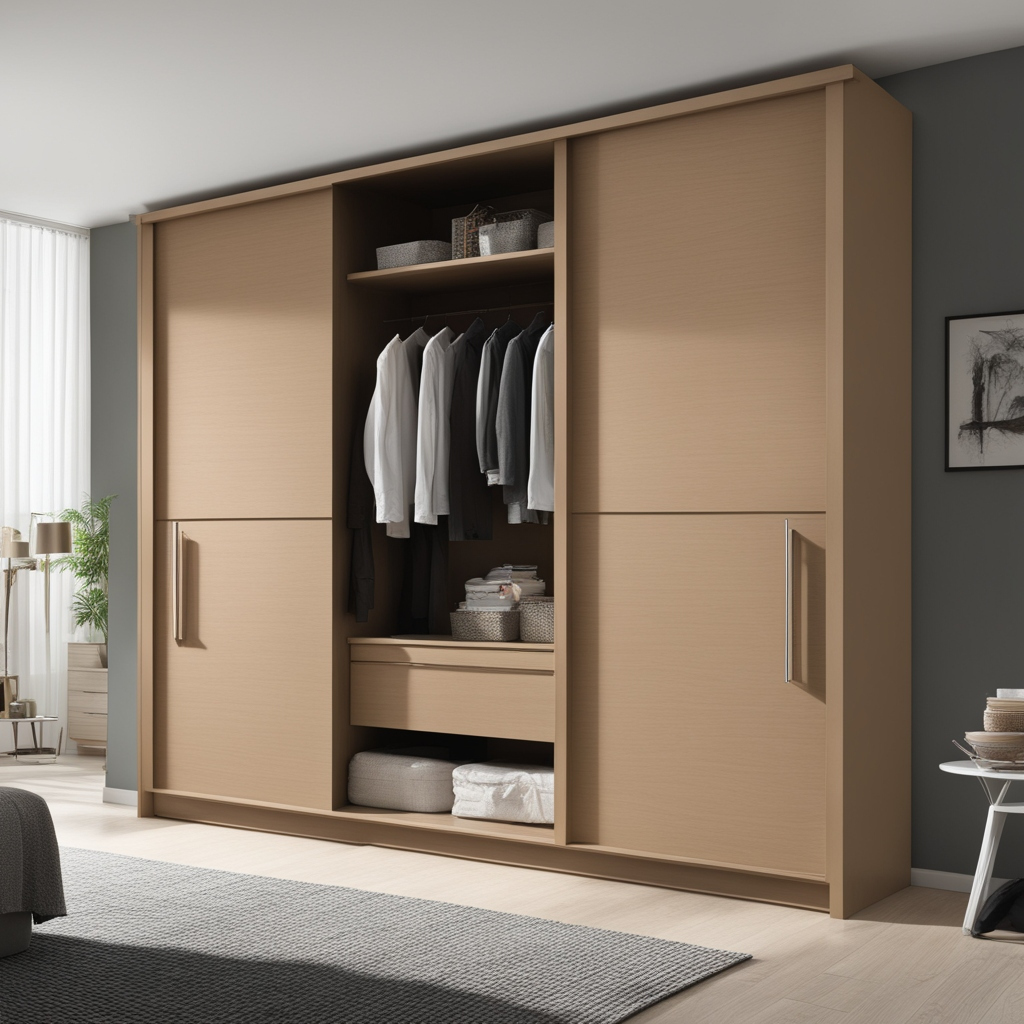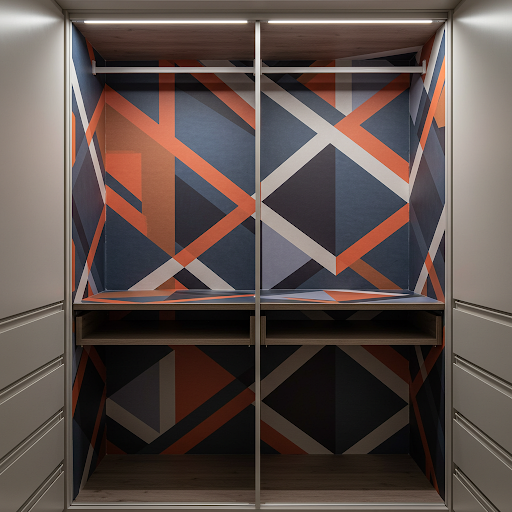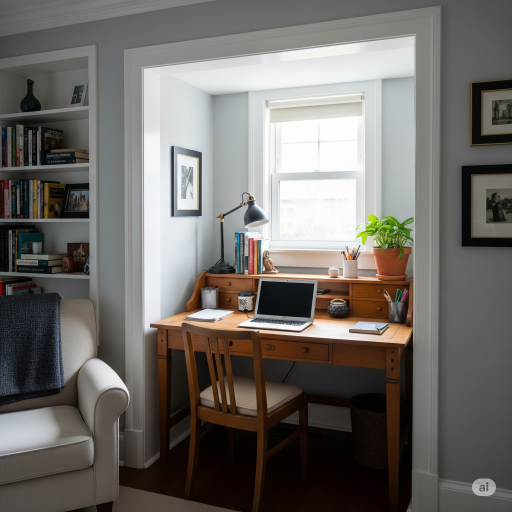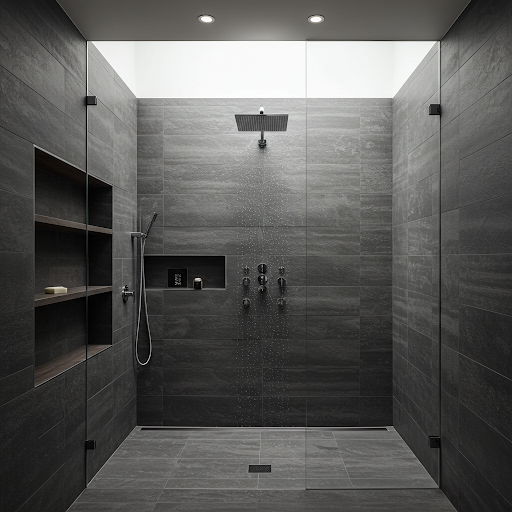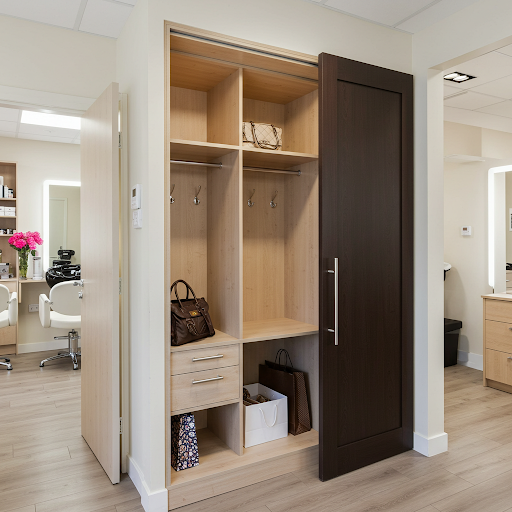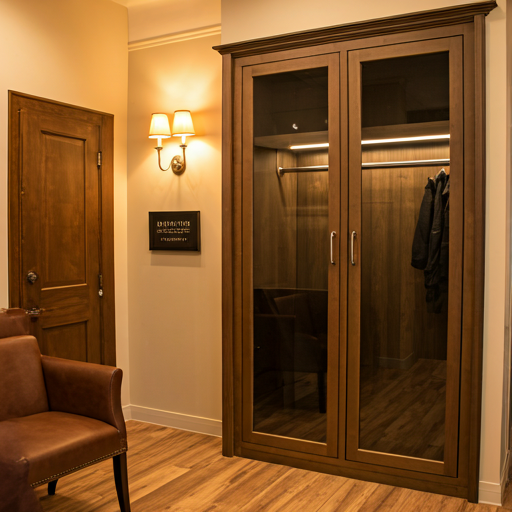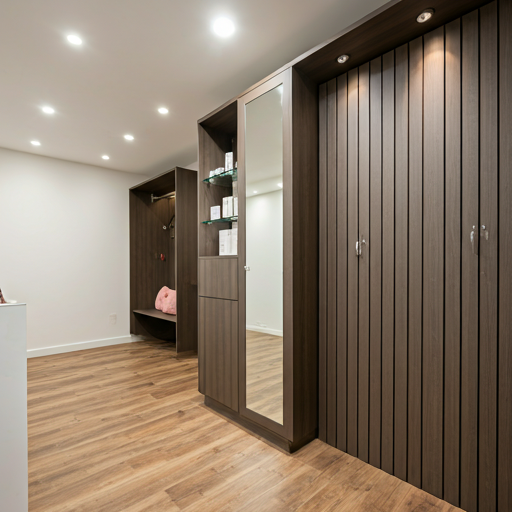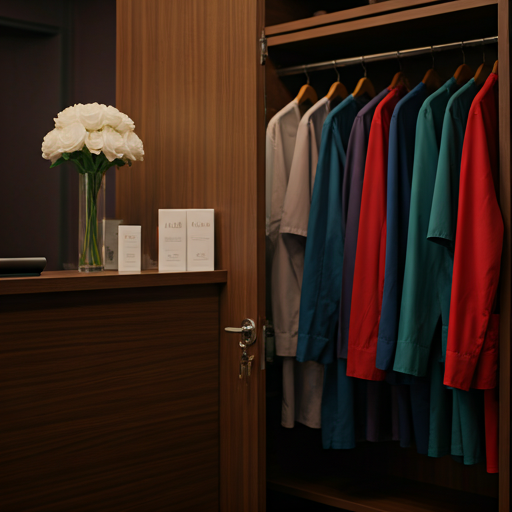Description
You can order custom-made MDF wardrobe designs from Wallpaper Kenya. Materials for wardrobe manufacturing are very diverse. It can be wood, chipboard, MDF, plastic, glass, and even aluminum. MDF wardrobes are in special demand, which is due to their affordable price and high quality. Advanced technologies are used to create this material, which makes it safe to use and reliable in operation.
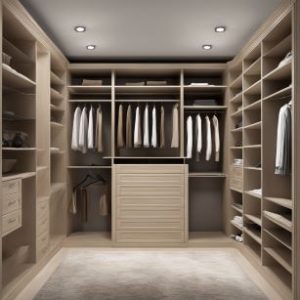 MDF means “medium density fibreboard”. To create it, instead of harmful resins and phenol for bonding sawdust, absolutely safe paraffin and lignin obtained from wood are used. As a result, MDF is a clean and environmentally friendly material, and wardrobes made from it will last for decades.
MDF means “medium density fibreboard”. To create it, instead of harmful resins and phenol for bonding sawdust, absolutely safe paraffin and lignin obtained from wood are used. As a result, MDF is a clean and environmentally friendly material, and wardrobes made from it will last for decades.
Veneer, PVC film, or enamel is used to cover MDF furniture. As a result of veneering and enameling, the furniture becomes resistant to mechanical damage and temperature fluctuations. PVC film, in turn, does not provide this effect in full.
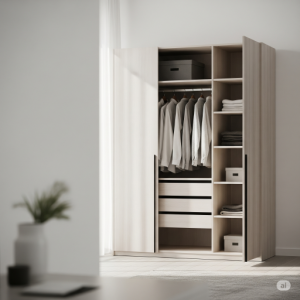
Our role as designers
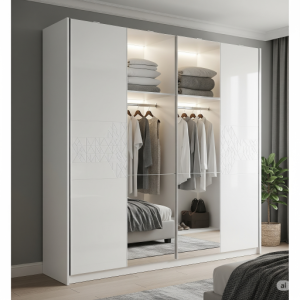
The designer’s role in MDF wardrobe making is pivotal, transforming your needs into functional, aesthetically pleasing realities. We begin by conceptualizing the wardrobe’s layout, your storage requirements, dimensions, and user flow.
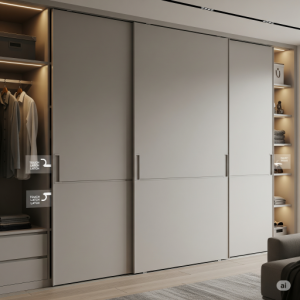
Material selection, particularly the specific grade and finish of MDF, influences both durability and appearance. The designer meticulously plans internal compartments, shelving, and hanging spaces, optimizing every inch. Crucially, we create detailed technical drawings and 3D renders, guiding manufacturers and ensuring precise execution, from panel cuts to hardware placement, ultimately delivering a stylish and practical storage solution.
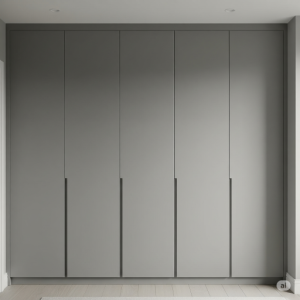
Here’s a breakdown of MDF wardrobe designs, including their benefits and drawbacks:
Benefits of Designing Wardrobes with MDF
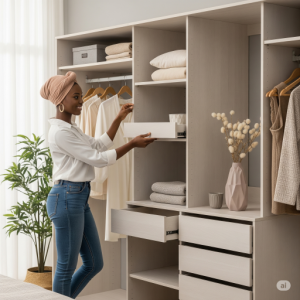
Cost-Effective
MDF is generally less expensive than solid wood, making it a budget-friendly option for creating stylish and functional wardrobes.
Smooth Surface
Its uniform and smooth surface is ideal for various finishes, including paint, laminate, and veneer, allowing for a wide range of aesthetic possibilities. You can achieve a flawless, modern look without visible wood grain.
Design Versatility
MDF’s consistent density and smooth surface make it a dream material for intricate wardrobe designs. Unlike solid wood, MDF lacks grain, allowing for seamless cutting, routing, and shaping without concerns about splitting or knot-related imperfections. This inherent workability empowers designers to create custom carvings, detailed mouldings, and unique features that would be challenging or cost-prohibitive with other materials. From elegant shaker-style doors with recessed panels to ornate baroque-inspired flourishes, MDF can be precisely tailored to match any room’s existing decor, offering unparalleled customization and a truly bespoke aesthetic for your wardrobe.
Stability and Consistency
Unlike solid wood, MDF doesn’t have a natural grain, which means it’s less prone to warping, cracking, or expanding/contracting with changes in temperature and humidity. This makes it a stable material for large panels and doors.
Eco-Friendly
MDF’s eco-friendly aspect largely stems from its composition: it utilizes recycled wood fibers and sawdust, which are by-products of other timber industries. This significantly reduces waste and lessens the demand for virgin timber, contributing to forest conservation and making MDF a more sustainable choice compared to solid wood.
Termite Resistant
Some MDF variants are treated with chemicals to make them resistant to termites and other insects.
Drawbacks of MDF Wardrobes
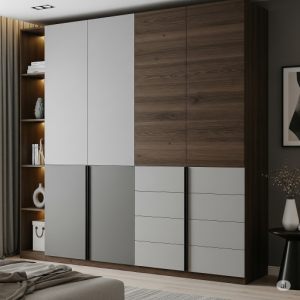
Susceptibility to Moisture
While some advanced MDF boards offer better moisture resistance, standard MDF can swell and lose its structural integrity if exposed to high levels of water or humidity without proper sealing.
Weight
MDF is denser and heavier than some other materials like plywood, which can make it more challenging to handle and install, especially for large pieces. Strong hinges and support are crucial.
Strength
While durable, MDF is not as strong as solid wood and can be more susceptible to chipping or denting with heavy impact. It may not hold screws as securely over time, especially with frequent use (e.g., hinges on frequently opened doors).
Difficulty in Repair
Deep dents or scratches in MDF can be harder to repair than in solid wood, which can often be sanded and refinished.
VOC Emissions
Some MDF products may release volatile organic compounds (VOCs) due to the resins used in their manufacturing, though many manufacturers now produce low-VOC or no-added-formaldehyde MDF.
MDF Wardrobe Design Ideas
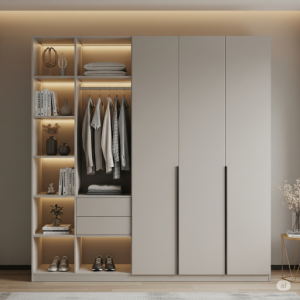
MDF’s versatility allows for a vast array of designs, from minimalist to highly decorative. Here are some popular design concepts:
Modern and Minimalist MDF Wardrobe Designs
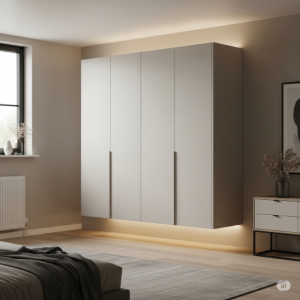
Sleek, handle-less doors
Achieved with push-to-open mechanisms or integrated finger pulls for a clean aesthetic.
Matte or glossy finishes
When choosing between matte and glossy finishes for your MDF wardrobe in Nairobi, consider your desired aesthetic. Matte offers a sophisticated, contemporary, and less reflective look, excellent for white, grey, or black, reducing visible fingerprints. Glossy provides a sleek, modern, and light-reflecting surface, ideal for bold solid colors, making rooms appear brighter and more expansive.
Recessed lighting
LED strips inside or along the top of the wardrobe for a contemporary feel.
Built-in or wall-to-wall designs
Built-in or wall-to-wall MDF wardrobe designs are excellent for maximizing space in Nairobi homes. By utilizing every available inch from floor to ceiling and wall to wall, they offer extensive storage. This integrated approach creates a sleek, seamless look that blends effortlessly with the room’s architecture, enhancing perceived space and aesthetic flow.
Sliding Door MDF Wardrobe Designs
Sliding door wardrobes are ideal for space-saving in Nairobi apartments, as they don’t require clearance for outward-swinging doors. MDF’s smooth finish is perfect for these large panels, allowing for sleek, contemporary designs that maximize storage without encroaching on room space.
Mirrored panels
Integrating mirrored panels into MDF wardrobe doors is a clever design choice for Nairobi homes. Mirrors visually expand the room, reflecting light and making spaces appear larger and brighter. They also offer functional full-length dressing mirrors, eliminating the need for a separate fixture and saving valuable floor space.
Combination of finishes
Combining finishes on MDF wardrobes offers dynamic visual appeal. For example, a matte white carcass can be paired with high-gloss drawer fronts in a contrasting color, or a wood-grain laminate section could be integrated with painted panels. This layering of textures and sheens creates a bespoke, sophisticated look.
Hinged Door MDF Wardrobes
Offer full access to the wardrobe interior when open.
Shaker-style doors
Simple, classic, and can be painted in any color.
Paneled doors
With raised or recessed panels for a more traditional or classic look.
Custom carvings or routing
MDF’s consistent composition and smooth surface make it perfect for intricate detailing. Using CNC routers, designers can precisely cut and engrave elaborate patterns, geometric designs, or even custom motifs directly onto wardrobe door panels. This allows for a level of customization and artistic expression that is difficult to achieve with other materials, creating truly unique and personalized wardrobes for Nairobi homes.
Walk-in Wardrobes/Closets
MDF is an excellent choice for walk-in wardrobes and closets, offering design flexibility and cost-effectiveness. Its smooth surface is ideal for painting, laminating, or veneering, allowing for a wide range of aesthetic finishes to match any interior. MDF can be precisely cut and routed, enabling intricate designs for shelving, drawers, and hanging spaces. This versatility makes it possible to create highly customized storage solutions that maximize every inch of a walk-in space. While durable, proper sealing and moisture control are essential for longevity.
L-shaped or Corner Wardrobes
L-shaped or corner wardrobes are clever solutions for maximizing storage in often underutilized room corners. An L-shaped design extends along two adjacent walls, offering significant hanging space, shelving, and drawers. This layout efficiently uses dead space and can be customized with various interior fittings like pull-out trays or shoe racks.
Corner wardrobes, particularly triangular ones, are ideal for smaller rooms, neatly fitting into the corner without sprawling along two walls. Both types help maintain room flow and reduce clutter, transforming awkward spaces into functional storage. Customization in size, material, and internal configuration ensures they seamlessly integrate with any decor.
MDF’s customizability makes it easy to create bespoke units that fit perfectly.
Integrated MDF Wardrobe Designs
MDF wardrobes offer exceptional versatility for seamless integration with existing furniture. Their smooth, uniform surface takes paint, laminate, or veneer finishes beautifully, allowing them to precisely match or complement any color scheme or wood tone in a room.
For a cohesive look, MDF wardrobes can be designed with features like fluted panels or specific handle styles that echo elements of other furniture pieces. They can also be integrated directly as built-in units, such as a wardrobe with an attached study desk, dressing table, or even a TV unit, maximizing space and creating a unified aesthetic. This adaptability makes MDF an ideal choice for harmonizing new storage with your current interior design.
Textured and Decorative Finishes
Laminated MDF
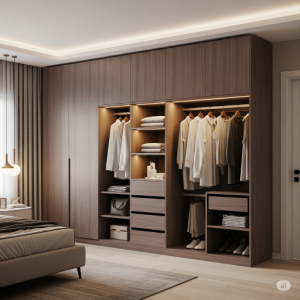
Laminated MDF is a fantastic material for wardrobes in Nairobi, offering a diverse palette of design options. It comes pre-finished with a decorative layer, eliminating the need for painting. This laminate can realistically mimic various wood grain patterns like oak, walnut, or cherry, providing the aesthetic of natural timber without the higher cost or maintenance. Beyond wood, you’ll find a wide array of solid colors, from classic whites and greys to vibrant blues or reds, perfect for contemporary or minimalist designs. Additionally, some laminated MDF features abstract designs or textures, adding a unique, modern flair to your wardrobe.
Veneered MDF
Veneered MDF offers the best of both worlds for Nairobi wardrobes. It features a thin layer of real wood veneer bonded to an MDF core, providing the authentic look and feel of solid timber – complete with natural grain and texture – but at a significantly lower cost. This makes genuine wood aesthetics more accessible.
MDF Wardrobe Painting
Painting MDF wardrobes is a popular and effective way to customize their look and protect the material. Given Nairobi’s climate, using a good primer and suitable paint is essential. Always start with a high-quality MDF-specific primer, as this seals the porous surface and prevents the paint from being absorbed unevenly. For a durable finish, especially in a wardrobe, opt for a hard-wearing topcoat like an eggshell, satin, or semi-gloss acrylic or latex paint. Apply multiple thin coats, sanding lightly between each for a smooth result. Properly sealing all edges is crucial, particularly in humid environments, to prevent moisture absorption and ensure the paint lasts.
Fluted or slatted designs
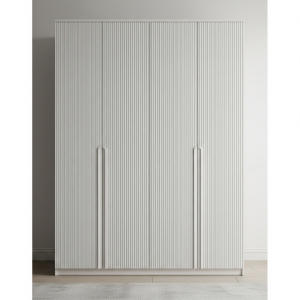
Fluted or slatted designs on MDF wardrobe doors offer a sophisticated, tactile element. These vertical textures add visual interest and depth, elevating a plain wardrobe into a stylish focal point. Perfect for contemporary or even art deco-inspired interiors, they provide a subtle yet impactful design statement.
Tips for Designing Wardrobes with MDF
Measure Accurately
Precisely measure the space to ensure a perfect fit and maximize storage.
Plan the Interior Layout
Planning your MDF wardrobe’s interior layout begins with a thorough inventory of your belongings. Categorize items: long dresses/coats, shirts/blouses, trousers (folded or hung), sweaters, t-shirts, underwear, socks, shoes, bags, and accessories like belts, ties, and jewelry.
Allocate specific zones: full-height hanging for long items, double hanging for shirts and trousers, adjustable shelves for folded clothes and bags, and drawers for smaller items. Incorporate specialized racks for shoes and accessories to maximize space. Consider pull-out mechanisms for easy access. This tailored approach ensures every item has a designated, accessible spot, keeping your wardrobe organized and efficient.
Choose the Right Thickness
Use the correct MDF thickness for wardrobe durability. For load-bearing shelves and the main structural carcass, opt for thicker boards, typically 18mm or 25mm, to prevent bowing and ensure stability. These provide the necessary strength to support clothing and other items. Thinner MDF, around 6mm to 9mm, is suitable for non-structural elements like back panels, drawer bottoms, and internal dividers, where less weight is applied. This strategic use of varying thicknesses optimizes material usage, reduces overall weight, and ensures the wardrobe’s longevity and structural integrity.
Consider the Finish
MDF’s smooth surface makes it ideal for painting, laminating, or veneering. Choose a finish that complements your room’s overall aesthetic.
Hardware Matters
For MDF wardrobes in Nairobi, select robust hardware. Opt for soft-close hinges and full-extension drawer slides to accommodate MDF’s weight and ensure smooth operation. Handles should complement your design style – consider durable metal or sturdy wooden options. Quality hardware prevents sagging and enhances the wardrobe’s longevity and user experience.
Moisture Protection
Designing wardrobes with moisture-resistant MDF is crucial, especially in humid climates like some parts of Kenya. This specialized MDF is engineered with enhanced resins to repel moisture, significantly reducing the risk of swelling, warping, and mold growth common with standard MDF in damp conditions.
When designing, prioritize proper ventilation within the wardrobe and the room to further mitigate humidity. Ensure all edges are thoroughly sealed with appropriate sealants or edge banding to prevent moisture ingress. While moisture-resistant MDF offers superior protection, it’s still best to avoid direct water exposure. This material allows for beautiful, durable, and long-lasting wardrobe solutions even in challenging environments.

